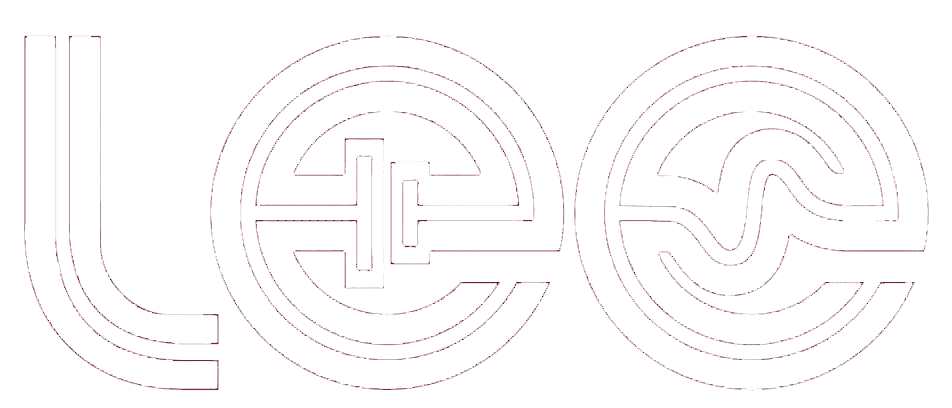Project NextGen publishes new review paper on borate-based compounds as cathode materials for advanced batteries
December 19, 2022
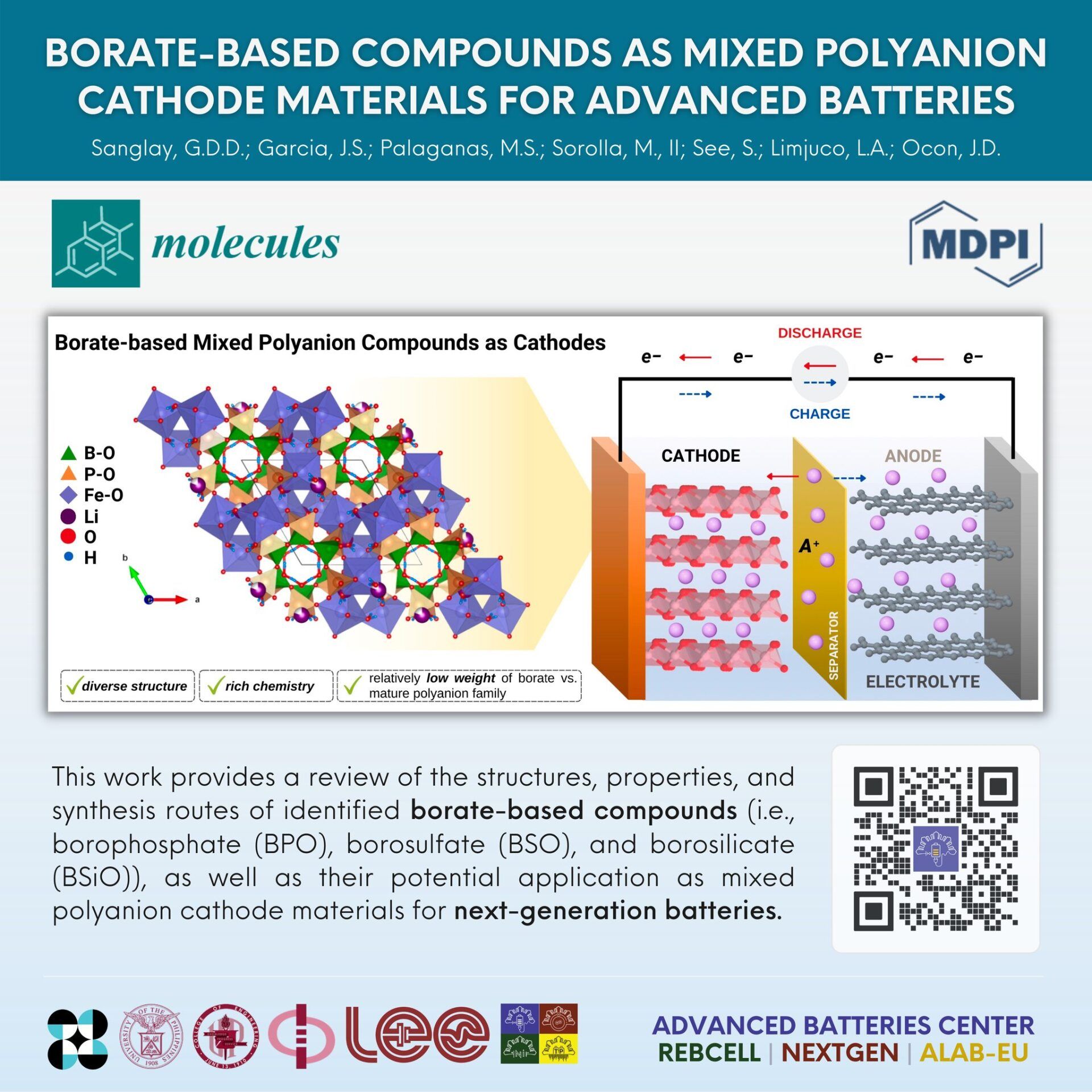
Project NextGen of LEE proudly presents the recently published review paper titled "𝗕𝗼𝗿𝗮𝘁𝗲-𝗕𝗮𝘀𝗲𝗱 𝗖𝗼𝗺𝗽𝗼𝘂𝗻𝗱𝘀 𝗮𝘀 𝗠𝗶𝘅𝗲𝗱 𝗣𝗼𝗹𝘆𝗮𝗻𝗶𝗼𝗻 𝗖𝗮𝘁𝗵𝗼𝗱𝗲 𝗠𝗮𝘁𝗲𝗿𝗶𝗮𝗹𝘀 𝗳𝗼𝗿 𝗔𝗱𝘃𝗮𝗻𝗰𝗲𝗱 𝗕𝗮𝘁𝘁𝗲𝗿𝗶𝗲𝘀" by Giancarlo Dominador D. Sanglay, Jayson S. Garcia, Mecaelah S. Palaganas, Maurice Sorolla, Sean See, Lawrence A. Limjuco, and Joey D. Ocon of the 𝐏𝐫𝐨𝐣𝐞𝐜𝐭 𝐍𝐞𝐱𝐭𝐆𝐞𝐧, 𝗔𝗱𝘃𝗮𝗻𝗰𝗲𝗱 𝗕𝗮𝘁𝘁𝗲𝗿𝗶𝗲𝘀 𝗖𝗲𝗻𝘁𝗲𝗿 𝗣𝗵𝗶𝗹𝗶𝗽𝗽𝗶𝗻𝗲𝘀.
Borate-based compounds offer tunability and versatility as potential cathode materials due to their (1) diverse structures that can host alkali metal intercalation; (2) low weight of borate relative to mature polyanion families, which can translate to higher theoretical capacity; and (3) rich chemistry that can alter the inductive effect on earth-abundant transition metals. Furthermore, its natural abundance and hence, cost advantage can contribute to its capacity as a cost-effective, high-performance cathode material for secondary batteries.
The untapped potential of borate-based compounds inspired the authors to provide a thorough review of the structures, properties, and synthesis routes of identified borate-based compounds (i.e., borophosphate (BPO), borosulfate (BSO), and borosilicate (BSiO)), as well as their potential application as mixed polyanion cathode materials for next-generation batteries.
This article is part of the Special Issue "𝐒𝐲𝐧𝐭𝐡𝐞𝐬𝐢𝐬 𝐚𝐧𝐝 𝐂𝐡𝐚𝐫𝐚𝐜𝐭𝐞𝐫𝐢𝐳𝐚𝐭𝐢𝐨𝐧 𝐨𝐟 𝐅𝐮𝐧𝐜𝐭𝐢𝐨𝐧𝐚𝐥 𝐌𝐚𝐭𝐞𝐫𝐢𝐚𝐥𝐬 𝐟𝐨𝐫 𝐄𝐥𝐞𝐜𝐭𝐫𝐨𝐜𝐡𝐞𝐦𝐢𝐜𝐚𝐥 𝐄𝐧𝐞𝐫𝐠𝐲 𝐒𝐭𝐨𝐫𝐚𝐠𝐞 𝐚𝐧𝐝 𝐂𝐨𝐧𝐯𝐞𝐫𝐬𝐢𝐨𝐧" of Molecules MDPI.
You may access and read the full paper through this link: https://www.mdpi.com/1420-3049/27/22/8047
𝗞𝗲𝘆𝘄𝗼𝗿𝗱𝘀: cathode; battery; mixed polyanion; borophosphate; borosulfate; borosilicate
𝘛𝘩𝘪𝘴 𝘸𝘰𝘳𝘬 𝘪𝘴 𝘧𝘶𝘯𝘥𝘦𝘥 𝘣𝘺 𝘵𝘩𝘦 𝘋𝘦𝘱𝘢𝘳𝘵𝘮𝘦𝘯𝘵 𝘰𝘧 𝘚𝘤𝘪𝘦𝘯𝘤𝘦 𝘢𝘯𝘥 𝘛𝘦𝘤𝘩𝘯𝘰𝘭𝘰𝘨𝘺 (𝘋𝘖𝘚𝘛) 𝘵𝘩𝘳𝘰𝘶𝘨𝘩 𝘵𝘩𝘦 𝘕𝘪𝘤𝘩𝘦 𝘊𝘦𝘯𝘵𝘦𝘳𝘴 𝘪𝘯 𝘵𝘩𝘦 𝘙𝘦𝘨𝘪𝘰𝘯𝘴 𝘧𝘰𝘳 𝘙&𝘋 (𝘕𝘐𝘊𝘌𝘙) 𝘗𝘳𝘰𝘨𝘳𝘢𝘮.
---
𝗔𝗱𝘃𝗮𝗻𝗰𝗲𝗱 𝗕𝗮𝘁𝘁𝗲𝗿𝗶𝗲𝘀 𝗖𝗲𝗻𝘁𝗲𝗿 𝗣𝗵𝗶𝗹𝗶𝗽𝗽𝗶𝗻𝗲𝘀 (𝗔𝗕𝗖 𝗣𝗛) is a collaborative R&D program between Technological Institute of the Philippines (TIP) and University of the Philippines Diliman (UPD) funded by the Department of Science and Technology (DOST) through DOST-Science for Change Program. The three projects under this program focus on innovating different battery chemistries.
The 𝗡𝗲𝘅𝘁𝗚𝗲𝗻 𝗣𝗿𝗼𝗷𝗲𝗰𝘁 aims to develop advanced cathode materials for next-generation batteries. The 𝗥𝗘𝗕𝗖𝗲𝗹𝗹 𝗣𝗿𝗼𝗷𝗲𝗰𝘁 targets to renew the Edison Battery using advanced cell architecture. 𝗔𝗟𝗔𝗕-𝗘𝗨 𝗣𝗿𝗼𝗷𝗲𝗰𝘁 pursues to develop advanced lead acid batteries with embedded ultrasonics.
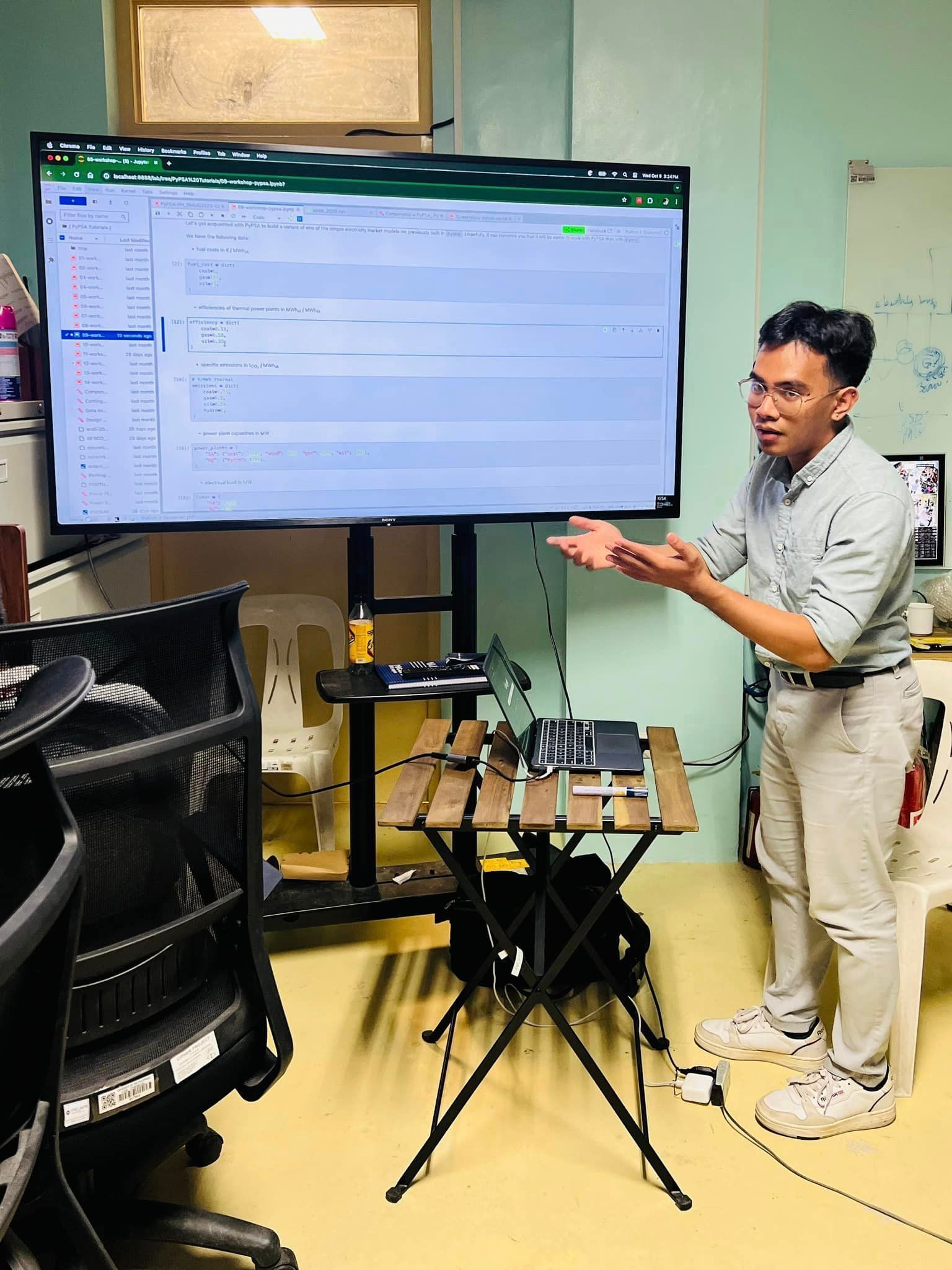
LEE research staff and graduate students participated in an in-house training and workshop on the Python for Power Systems Analysis (PyPSA) toolbox on October 9 and 23, 2024 . The sessions were led by Arizeo Salac (SRS 1, ElectriPHI), who returned from a six-month research sandwich program at the Reiner Lemoine Institute in Berlin, Germany , where he focused on data-driven decision-making and energy systems modeling. The training included a detailed discussion on energy systems modeling, with key topics such as data sources and the representation of energy systems using both conventional and renewable technologies. Participants received hands-on assistance with the software setup and installation, followed by simulation activities that showcased PyPSA’s capabilities in energy and power systems analysis. Mr. Salac also presented his baseline model of the Philippine energy system, which can be utilized for energy transition scenario planning. The event aimed to enhance participants' proficiency with open-source modeling tools, share best practices in modeling, and support their research in energy systems. Article by: Sophia Lunor
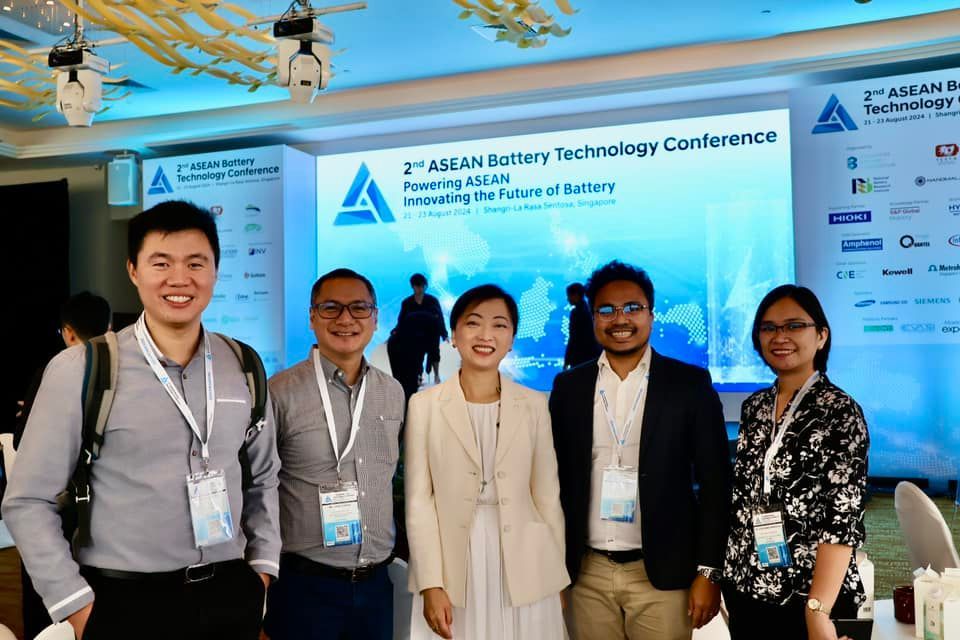
Prof. Joey D. Ocon, Dr. Julie Anne D.R. Paraggua, Dr. Lawrence Limjuco, and Giancarlo Sanglay were among the Filipino delegates at the 2nd ASEAN Battery Technology Conference , held from August 21 to 23, 2024 , at the Shangri-La Rasa Sentosa in Singapore. Themed "Powering ASEAN: Innovating the Future of Battery," the event was co-organized by key ASEAN associations from Singapore, Thailand, Indonesia, Malaysia, and the Philippines. They were accompanied by LEE member and graduate student, Giancarlo Sanglay and NextGen Project Chief Technical Specialist, Dr. Lawrence Limjuco, of the Advanced Batteries Center. The conference aimed to foster connections among researchers, engineers, and industry stakeholders within the battery and electric vehicle (EV) sectors. It provided a platform for knowledge exchange, technical discussions, and potential collaborations. Key topics included the development of the Battery and EV Roadmap for Southeast Asia, as well as government policies and regulations surrounding battery and energy storage systems (ESS) applications. Industry leaders and academic experts also addressed technological advancements in battery materials, financial support for innovations, and strategies for managing the end-of-life value chain of batteries. Prof. Ocon, who also serves as Co-Founder of Nascent Batteries, played an active role in the event by moderating a panel discussion on advancing ESS technologies in Asia. The panel featured representatives from prominent organizations, including EDP Renewables APAC, Green Tenaga Pte Ltd, and the Electricity Generating Authority of Thailand. This collaborative event underscored the region's commitment to advancing sustainable energy solutions and highlighted the critical role of ASEAN countries in driving innovation within the battery and EV industries. Article by: Lora Monique Sapanta
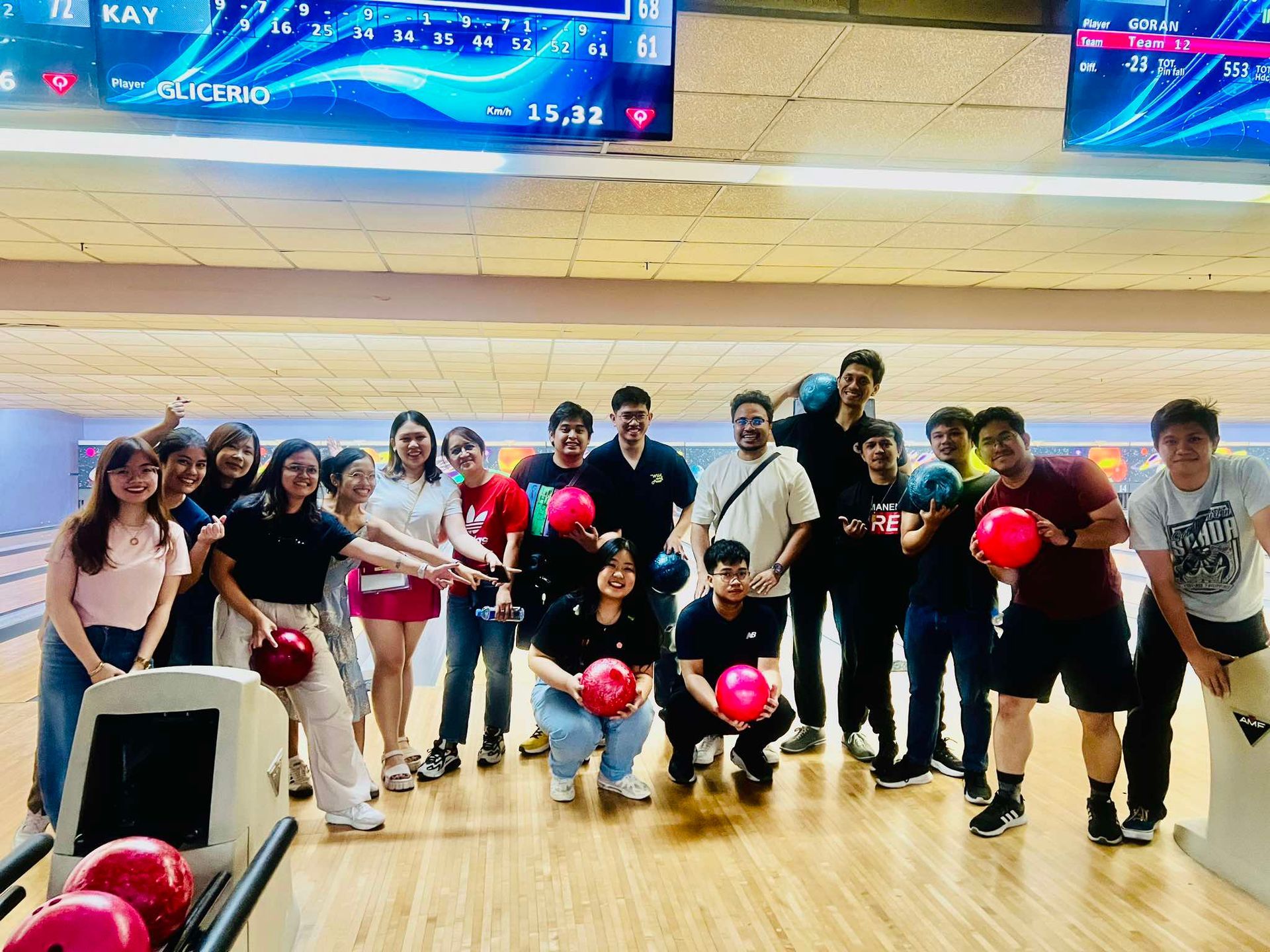
The Laboratory of Electrochemical Engineering (LEE) held a despedida party to bid farewell to two of its active members — Ms. Rosela Lazaro and Asst. Prof. Michael Castro — as they embark on a new chapter of their academic journey. The LEE members, along with their laboratory head, Prof. Joey D. Ocon, celebrated through a friendly competition at the Ever Gotesco Bowling Alley, Commonwealth Avenue last August 19, 2024. This also fostered camaraderie and strengthened the bond and friendship between the lab members. Ms. Lazaro will be studying MS in Environmental Science and Engineering at Gwangju Institute of Science and Technology, South Korea. Meanwhile, Asst. Prof. Castro will be pursuing a doctorate degree in Nuclear Engineering and Management at the University of Tokyo, Japan. He will be returning to UP Diliman to tend to his duties at the Department of Chemical Engineering. Indeed, ‘goodbyes’ are not the end. It marks a beginning of a new ‘hello’, a step closer to making dreams come true. To Sir Michael, ganbatte! To Sela, hwaiting! We are all rooting for you both! Article by: Lora Monique Sapanta


